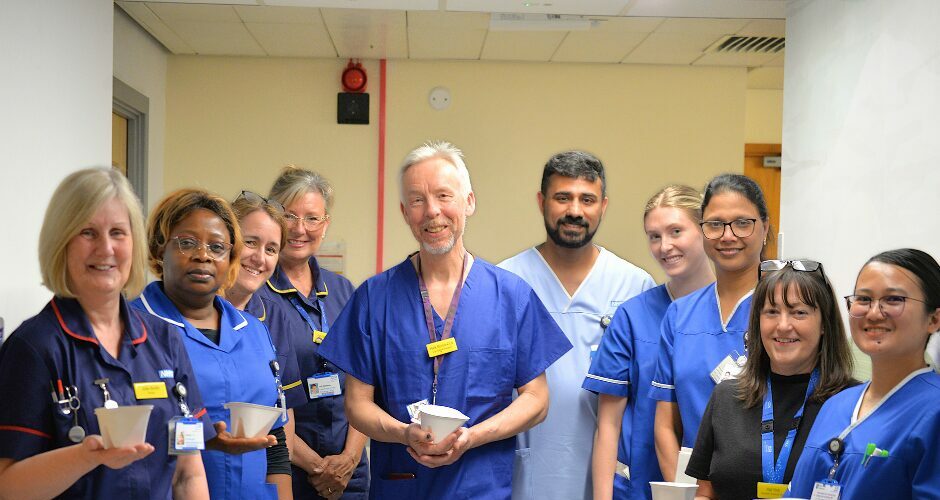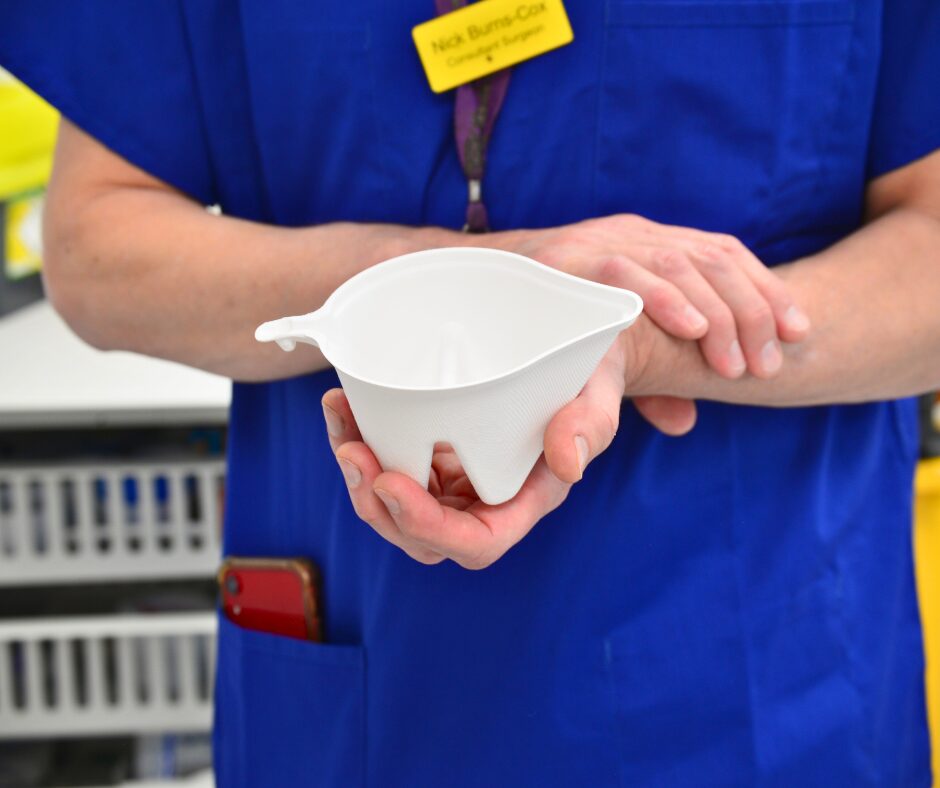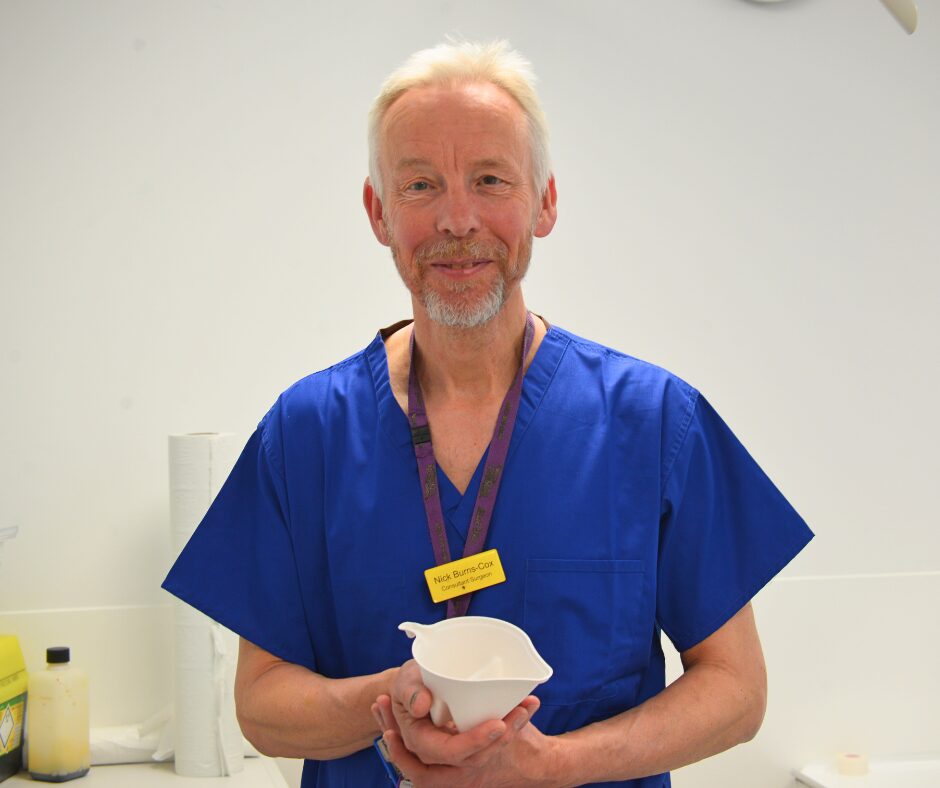
Spotlight
Our own Somerset surgeon invents new eco-friendly way to collect urine samples
Anyone who has ever had to take a urine test may be familiar with a little 30ml plastic urine pot with a red top and a patient sticker on the side, which they’ll have been asked to urinate into for a sample.
Nick Burns-Cox, our consultant urologist, has invented a brand new way to collect urine with a ‘Pee in Pot’ (PiP) – made from biodegradable pulp, rather than plastic.
The innovation, which has taken 10 years of tests, prototypes and studies to get right, is now available for NHS organisations across the country to start using.
Nick explained how it all began when he was running a clinic in the outpatients department at Chard Community Hospital, and needed to test a patient’s urine to check for an infection.
“The ward manager asked me how she was supposed to get a urine sample from a patient into the 10ml urine collection tube the labs needed, which is about as big as your finger,” he said.
“In order to get the urine in the 10ml, we were asking patients to urinate in a sterile bowl, which was syringed into a 30ml tube, sent to the lab, with a laboratory technician then needing to pipette the urine into a 10ml plastic tube for analysis.
“Looking back at the way we were doing things, it was messy, with many different colleagues using lots of different containers to get the urine in the right sized pot to go to the labs, which was very time consuming for colleagues.
“Alongside that, every time we handle a urine specimen we increase the risk of human error. Whether that comes from mislabelling a sample as we change containers, or through accidentally introducing contamination. If that happens we need to repeat the whole process again.
“Not only was it wasting time, but it was wasting materials. Lots of single use plastic was being used for every collection. I saw the problem and knew we needed to make something that was fit for purpose and better for our environment.”
Nick worked with his colleagues, talking to a variety of patients, healthcare assistants, nurses, medics and lab colleagues to see if he could find a solution.
“Seeing the problem made me think there must be an answer for this,” he continued. “I spoke with my neighbour, Steve Swan, who had the initial idea of a built-in funnel, which then evolved into the first prototype of the PiP.
“We continued this until we finally had a pot that not only provides a more sustainable way of collecting urine, but has a series of sections built into it, meaning that nurses and health care assistants can measure out the 10ml of urine that they need to get it into the right tube without any other products needed.”
In the initial stages, Nick investigated what was already being used to collect urine, and he found many departments across the trust were doing different things, which made him ask the question of whether the PiP needed to be sterile, or just ‘clean’.

Tracey Doolan, an infection prevention and control nurse at our trust, has been working with Nick for 20 years and has championed the PiP from an initial trial in just one ward at Musgrove Park Hospital, to helping spread PiPs across the NHS today.
She explained: “We were really interested in Nick’s innovation from an infection control point of view, which led to lots of insight into our current practices and made us question how we do things and whether we could collect urine without needing to use a ‘sterile’ pot which has much larger CO2 and costs more too.
“We worked with an academic consultant microbiologist, medical statisticians, a clinical sustainability fellow, laboratory teams and infection control colleagues to test our research.
“We found that the PiP was safe to use for collecting urine, and didn’t contaminate the specimen, meaning it didn’t need to be sterile – a big step forward for us.”
As the PiP is made from white pulp, it can be flushed in a macerator, rather than plastic, which is incinerated – making it seven times more environmentally friendly, compared with collecting urine in sterile plastic bowls. Just the reduction in plastic incineration will save the trust around £300 for every 21,000 sterile bowls previously used.
Macerators are used across hospitals to break up pulp waste such as bedpans, urine bottles and sick bowls, which are turned into slurry and go through the sewage system. The PiP is made from ThermofibreTM, a blend of bamboo fibres and sugar cane pulp which is formed at high temperatures in clean room conditions.
For every thousand hospital beds, urine needs to be collected around 21,000 times a year, so the benefits of having a more environmentally-friendly solution are substantial.
The carbon reduction from not using the plastic equates to about three tonnes a year across the entire NHS – that’s as much as over six houses electricity use for a year!
Nick continued: “It’s much easier for patients to use, as my friends and family who have tested my many prototypes can attest to! As it’s got a larger surface area patients don’t have to struggle, especially when they are unwell or have poor mobility.
For example at every midwife appointment, we ask patients to do a urine sample and trying to do this while nine months pregnant is quite a feat!”
For Somerset NHS Foundation Trust, with around 1,000 inpatient beds across acute, community and mental health sites, just the time saving of a shorter and easier urine collection process saves about £166,000 a year.
In practice this time can be spent on other patient-facing care tasks and vital laboratory work, making the health system more efficient.
Nick’s passion for sustainability has shone through this project, from applying to grants and getting funding from the Small Business Research Initiative (SBRI), to listening to every colleague involved in urine collection. This has helped to make the PiP easy to use, by adding a lip to make them simpler to separate from each other, and making sure they stack efficiently.
He added: “The traditional model for designing products in operating theatres is that private companies develop, make and sell items, having not lived in our shoes and experienced our day-to-day problems. But as healthcare professionals, we are in the perfect position to develop solutions to important clinical problems.
“We are used to the idea and perception that it’s not for NHS colleagues to design solutions – but it absolutely can be. All the professionals who have helped get this innovation to completion show what we can achieve by working together.
“With every PiP that finds its way into GPs, clinics, hospitals and wider in the community, I hope it makes patients and colleagues lives easier, but most importantly people know that by using a PiP, they are doing their bit for the environment.”
Visit the PiP’s website to find out more.


